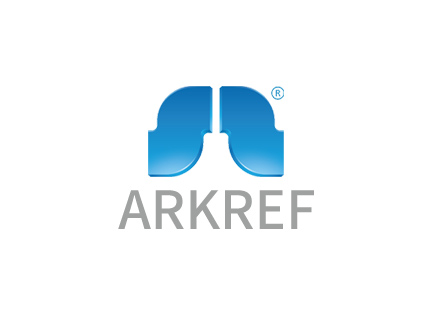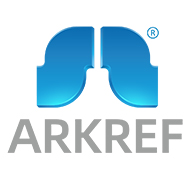Understanding Industrial Chillers and Their Role in Manufacturing
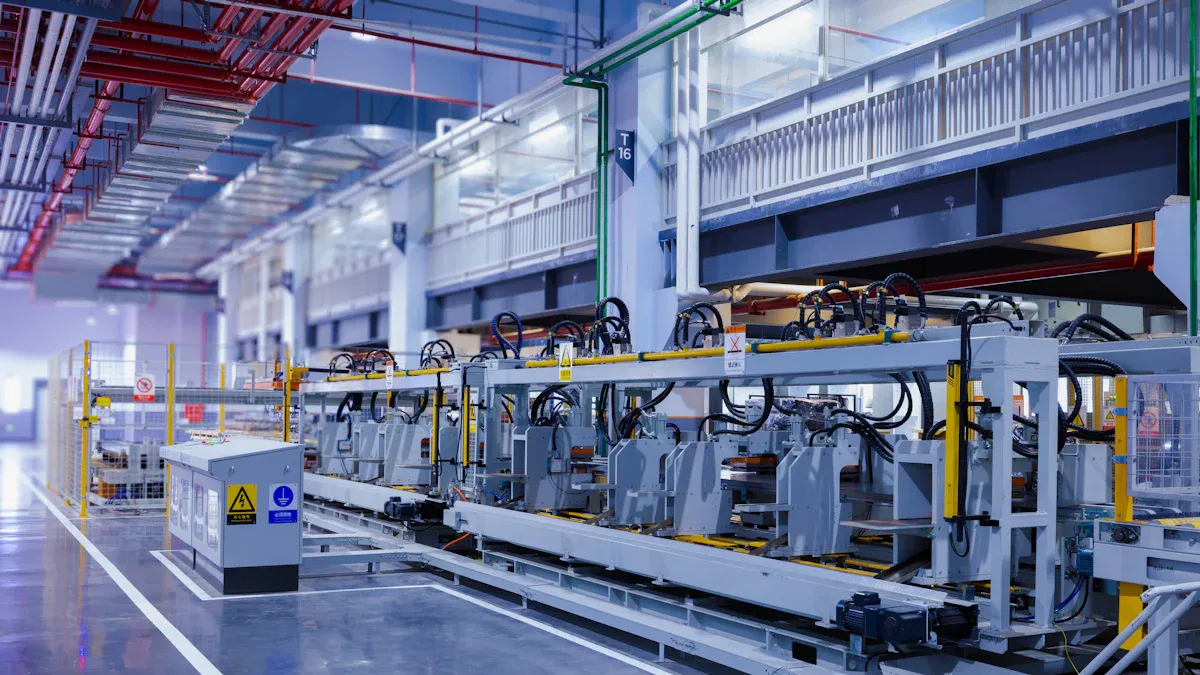
An industrial chiller is a system that cools machines. It removes heat to keep equipment at the right temperature. This helps machines work properly and stay efficient. Chillers stop overheating, reduce breaks, and improve product quality. They are important in factories and production lines. Chillers ensure smooth operations and save energy. They are reliable for industries needing steady performance.
Key Takeaways
Industrial chillers help keep machines cool during manufacturing. They stop overheating and make work more efficient.
Picking the right chiller—air-cooled, water-cooled, absorption, or evaporative—depends on what you need and how big your operation is.
Taking care of chillers, like cleaning and checking refrigerants, helps them work well and last longer.
New chillers save energy, cut costs, and are better for the environment. They are a smart choice for factories.
Knowing what cooling you need and choosing a good supplier makes your chiller system work better and keeps you happy.
What Are Industrial Chillers?
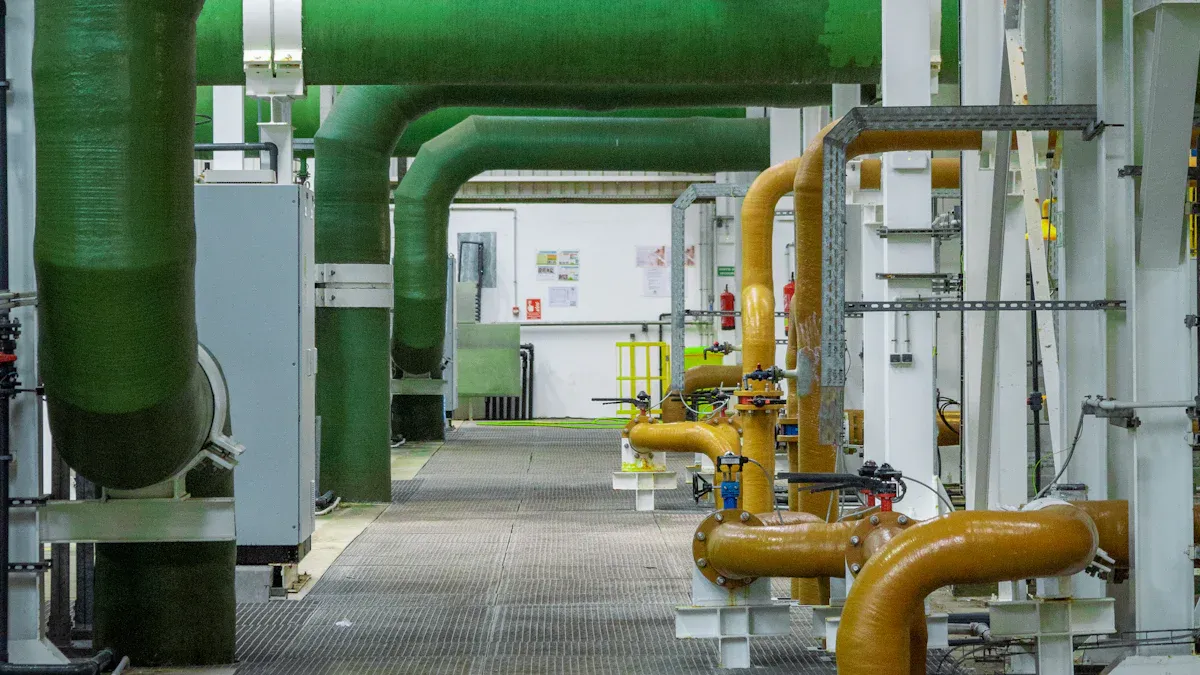
Industrial chillers are systems that help control temperatures in factories. They keep machines running well by removing extra heat. To see why they matter, it's good to learn about their parts, types, and how they work.
Core components of industrial chillers
Industrial chillers have important parts that make cooling possible. These parts work together to keep temperatures steady.
Component | Function |
|---|---|
Evaporator | Takes heat from the fluid, making the refrigerant cool it. |
Raises refrigerant pressure so it can move through the system. | |
Condenser | Removes heat from refrigerant, turning it back into a liquid. |
Expansion Valve | Controls refrigerant flow, helping the evaporator absorb heat. |
Refrigerant | A fluid that changes form to take in or release heat. |
These parts are the main pieces that keep chillers working smoothly.
Types of industrial chillers
There are different kinds of industrial chillers for various needs. You can pick from these options:
Air-cooled chillers: Use fans to release heat into the air. Great for places with little water.
Water-cooled chillers: Use water to remove heat. They work well for big operations.
Absorption chillers: Use heat instead of electricity to cool. Good for places with extra waste heat.
Evaporative-cooled chillers: Mix air and water cooling for better efficiency and balance.
Each type has its own benefits, so you can choose what fits best.
How industrial chillers function
Industrial chillers work by moving heat away from machines or processes. First, the evaporator takes heat from the fluid being cooled. The refrigerant inside absorbs this heat and turns into vapor.
The compressor then increases the refrigerant's pressure, pushing it to the condenser. In the condenser, the refrigerant releases heat and becomes liquid again. The expansion valve controls how much refrigerant goes back to the evaporator, repeating the cycle.
Efficiency is measured using SEPR (Seasonal Energy Performance Ratio). SEPR compares cooling output to energy used over a year. It considers real conditions and different workloads. Systems like SEPR HT (7°C to 12°C), SEPR MT (-8°C to 7°C), and SEPR LT (below -25°C) handle various cooling needs.
Modern chillers follow Eco-Design rules to save energy and protect the environment. Knowing how chillers work shows their importance in keeping factories running efficiently.
Applications of Industrial Chillers
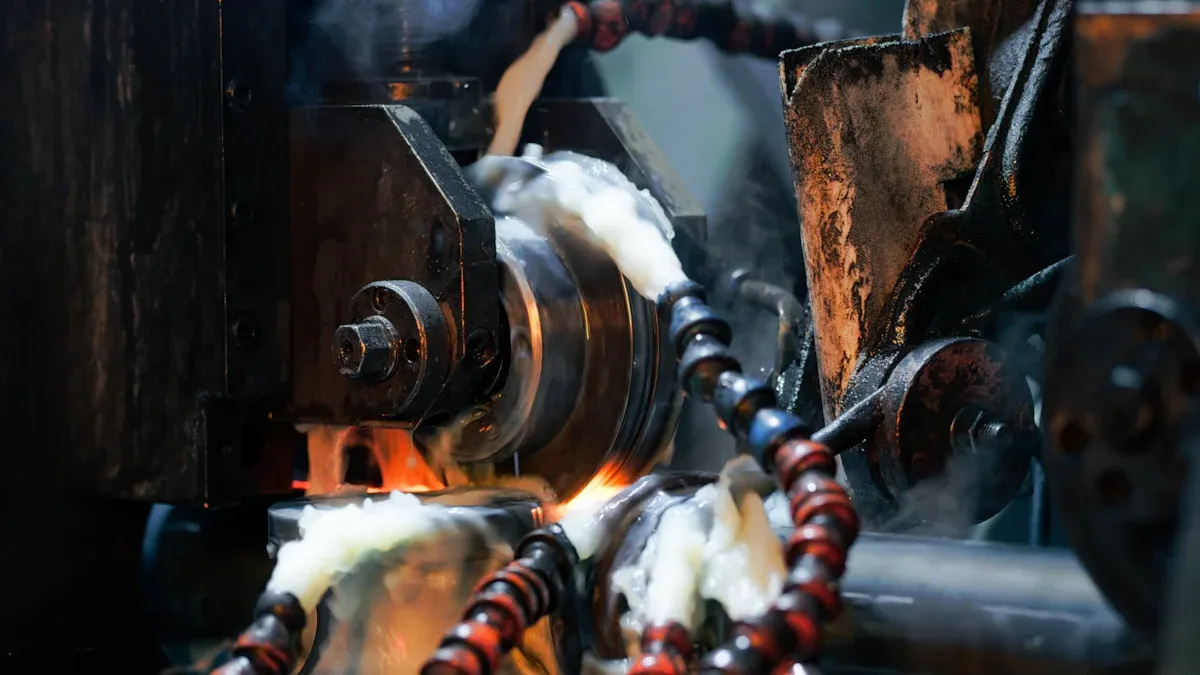
Industrial chillers are important for keeping temperatures steady in industries. They help machines work better, improve product quality, and save energy. Below are some ways chillers are used.
Plastics and rubber manufacturing
Chillers are key in plastics and rubber production. They cool molds, extruders, and other tools. Without cooling, heat can ruin the final product. For example, plastic molds need even cooling to harden properly and keep their shape.
Chillers also speed up production. They remove heat fast, letting machines run longer without overheating. This reduces breaks and boosts output. Whether making bottles or tires, chillers keep processes smooth.
Tip: Large operations often use water-cooled chillers. These chillers save energy and cool better than air-cooled ones.
Food and beverage processing
Food and drink production needs exact temperature control for safety and quality. Chillers cool ingredients, store items, and manage fermentation. For example, breweries use chillers to keep yeast at the right temperature, avoiding spoilage and keeping flavors consistent.
Even small temperature changes can cause big problems. A rise of 1°C or 2°C might ruin food or drinks. Chillers stop this by cooling precisely. They also help meet safety rules by keeping products cold during production and storage.
Benefits of chillers in food and drink production:
Stop spoilage with steady cooling.
Improve taste and quality.
Help follow safety standards.
Pharmaceutical and chemical production
Pharmaceutical and chemical factories need exact temperature control for good results. Chillers keep conditions stable for chemical reactions, drug making, and storage. Lab chillers cool tools to ensure experiments are accurate.
Smart chillers are becoming popular in this field. They use IoT to monitor systems and predict maintenance needs. This reduces downtime and improves efficiency. Eco-friendly refrigerants also meet environmental rules, making chillers a green choice.
Note: Energy-saving chillers can help meet green building goals and lower carbon emissions.
Metalworking and machining
Metalworking and machining create a lot of heat from friction. Industrial chillers cool machines to keep them working accurately. Too much heat can bend materials, wear out tools, and lower product quality. Chillers stop these problems by removing heat quickly.
CNC machines and laser cutters need chillers to stay at steady temperatures. This helps them cut precisely and last longer. Chillers also cool fluids like lubricants and hydraulics. This makes tools work better and reduces damage, saving repair costs.
Modern chillers are energy-saving and fit metalworking needs. They help meet eco-friendly goals while keeping production smooth. Whether using steel, aluminum, or other metals, chillers are key for efficient operations.
Tip: Large machining facilities should use water-cooled chillers. These are great for cooling heavy equipment and processes.
Other industries utilizing chillers
Industrial chillers are useful in many industries needing temperature control. They help keep products safe or provide temporary cooling. Below are examples of how chillers help:
Benefit | Industry Examples |
|---|---|
Pharmaceuticals, Food Storage | |
Easy to move and use | Temporary cooling in various sectors |
Handle sudden cooling needs | Events, Emergency cooling |
Create controlled environments | Pharmaceuticals, Food, Data Centers |
Fight rising global temperatures | All industries needing cooling |
Save energy with smart solutions | Industries focused on sustainability |
In data centers, chillers stop servers from overheating. This keeps systems running without interruptions. For events, portable chillers cool large spaces or outdoor areas. Emergency cooling uses chillers to fix sudden heat problems in critical places.
As the world gets hotter, chillers are needed more. They create cool spaces to protect items and equipment. Modern chillers also save energy, helping industries stay green.
Note: Air-cooled chillers are simple to set up. They work well for temporary cooling needs.
Benefits of Industrial Chillers
Energy efficiency and cost savings
Industrial chillers help save energy and lower costs. Modern systems use smart technology to cool while using less power. This reduces electricity bills and makes factories more efficient.
Some chillers have features like adjustable-speed compressors and smart controls. These adjust cooling based on needs, avoiding wasted energy. Over time, this saves money for your business.
Tip: Keep your chiller clean and check parts often. This avoids energy waste.
Precision cooling for enhanced product quality
Exact temperature control is key for making good products. Industrial chillers keep cooling steady, helping processes stay within the right range.
For example, uneven cooling in plastic molding can cause defects. A dependable chiller keeps temperatures even, preventing problems. This improves product quality and reduces waste.
Benefits of precision cooling:
Makes products more consistent.
Lowers production mistakes.
Keeps customers happy.
Extended equipment lifespan
Too much heat can harm machines and shorten their life. Industrial chillers remove heat to protect equipment. Cool machines last longer and need fewer repairs.
Using a chiller lowers overheating risks and repair costs. It also keeps machines running smoothly with less downtime.
Note: Pick a chiller that matches your equipment for better protection.
Environmental advantages of modern chillers
Modern chillers are great for the environment. They help industries lower their carbon footprint. Advanced technology in these systems saves energy and protects nature.
One big benefit is using eco-friendly refrigerants. Older systems used harmful ones, but modern chillers use refrigerants with low global warming potential (GWP). This helps meet strict environmental rules and reduces harm to the planet. You can pick a chiller that fits your green goals and cools efficiently.
Energy-saving is another advantage. Modern chillers use less electricity with smart features like variable-speed compressors. These adjust cooling based on demand, stopping energy waste. Using less power lowers greenhouse gases and saves money.
Tip: Keep your chiller clean and maintained to reduce its impact.
Recycling is also important. Many modern chillers are made with recyclable parts. This makes them easier to dispose of responsibly. Some systems allow upgrades, so they last longer and create less waste.
Water conservation is another plus. Water-cooled chillers now use designs that save water while working well. This is helpful in areas with limited water supplies.
Modern chillers improve operations and fight climate change. They show how technology can meet industrial needs while caring for the planet.
Selecting the Right Industrial Chiller
Evaluating cooling requirements
Picking the right industrial chiller starts with knowing your needs. Think about what your processes require, like fluid types, flow rates, and temperature ranges. Some fluids might be thick or harmful, needing special equipment to handle them safely.
The demand for cooling systems is rising due to hotter climates and growing cities. This makes it even more important to understand your cooling needs. New technology and rules in the cooling market can help you choose a chiller that works well and follows industry standards.
Tip: Choose a chiller that fits your long-term goals. It can save money and improve efficiency over time.
Considering energy efficiency
Energy efficiency matters a lot when picking a chiller. Modern systems have smart controls and modular designs to save energy. Modular chillers let you control smaller units separately, making them flexible and efficient.
Features like variable-speed compressors and eco-friendly refrigerants make chillers even better. These designs cut electricity costs and lower environmental impact. Choosing energy-efficient options helps save money and supports green goals.
Note: Look for chillers with smart systems that adjust cooling as needed. This avoids wasting energy and keeps performance steady.
Space and installation constraints
Limited space can affect which chiller you pick. Compact or modular designs work well in tight areas. These are easy to install and fit into existing setups. Industries like food or medicine may need chillers built for cleanliness to meet health rules.
Think about your process needs, like fluid pressure and temperature, when planning installation. Easy-to-maintain features, like clean-in-place systems, make chillers more user-friendly. For small spaces, pick a design that balances function and accessibility.
Tip: Portable chillers with easy-to-remove panels can simplify maintenance in cramped areas.
Maintenance and serviceability
Taking care of your chiller helps it work well and last longer. Regular checks stop sudden problems and lower repair costs. Make a plan to maintain the system regularly.
Look at key parts like the evaporator, compressor, and condenser. Clean these parts often to remove dirt that can slow them down. Check the refrigerant levels to keep cooling steady. Low refrigerant can cause damage or poor performance.
Listen for strange sounds or vibrations. These can mean something is wrong and needs fixing fast. Replace old parts quickly to prevent bigger issues. Keep a record of maintenance to track how the system is doing.
Tip: Hire experts for yearly check-ups. They can find hidden problems and ensure safety rules are followed.
New chillers often have smart systems that warn you about issues early. These tools make maintenance easier and keep the system reliable.
Choosing reliable manufacturers or suppliers
Picking the right company is key to getting a good chiller. A trusted supplier gives you a system that fits your needs and offers support.
Check the company’s reputation by reading reviews from other buyers. A well-rated company is more likely to sell reliable products.
See what types of chillers they offer. They should have options for small or large needs. Ask if their chillers save energy. Energy-saving systems cut costs and help the environment.
Note: Pick a supplier with great customer service. Quick help and easy support make a big difference.
Look for a good warranty and after-sales service. A strong warranty shows the company trusts its product. Good support ensures you get help when needed.
Choosing a reliable supplier means you get a chiller that works well and lasts a long time.
Industrial chillers are important for keeping factories running smoothly. They control temperatures, improve product quality, and protect machines. Using a chiller helps save energy and meet industry needs.
To pick the right chiller, think about your cooling needs. Look at energy use and how easy it is to maintain. A good chiller supports your work and helps the environment. By knowing what you need, you can choose the best system for your factory.
FAQ
What is the difference between air-cooled and water-cooled chillers?
Air-cooled chillers use fans to cool by releasing heat into the air. They work well in places with little water. Water-cooled chillers use water to remove heat, making them better for big operations needing high efficiency.
Tip: Use air-cooled chillers for small setups. Pick water-cooled chillers for heavy-duty cooling.
How do I maintain an industrial chiller?
To keep a chiller working well, clean parts like the evaporator and condenser often. Check refrigerant levels and listen for strange sounds or vibrations. Plan yearly professional inspections to ensure safety and top performance.
Note: Clean chillers work better and last longer.
Can industrial chillers help reduce energy costs?
Yes, modern chillers save energy with smart controls and efficient designs. Features like variable-speed compressors adjust cooling to match needs, stopping energy waste and lowering bills.
Tip: Choose energy-saving chillers to cut costs and help the planet.
Are portable chillers suitable for temporary cooling needs?
Portable chillers are great for short-term cooling. They are simple to set up and move, making them useful for events, emergencies, or temporary industrial tasks.
Emoji: 🛠️ Portable chillers are handy and easy to use.
What refrigerants are used in eco-friendly chillers?
Eco-friendly chillers use refrigerants with low global warming potential (GWP). Examples include R-32 and R-1234yf. These options are safer for the environment and meet strict rules.
Tip: Check refrigerants to ensure they follow green standards.
See Also
A Comprehensive Guide to Water Chiller Unit Functions
Choosing the Right Industrial Water Chiller Units Made Easy
Maximizing Efficiency in Walk-In Chiller Operations
Exploring How Industrial Freezing Tunnels Operate Effectively
Enhancing Performance of Chillers and Compressors in ARKREF Units
